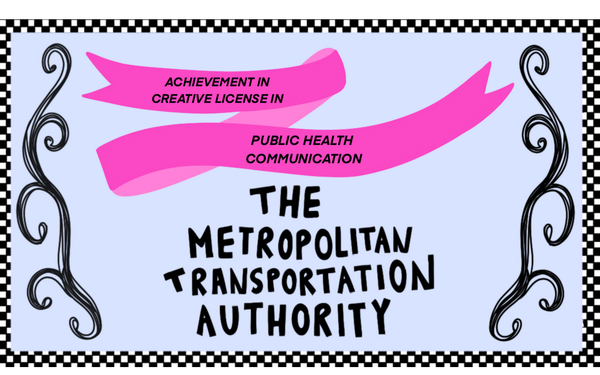
With fewer NYC subway riders masking up these days (while I
always do), I’ve been feeling vaguely unsafe whenever on a crowded train. So I was delighted to learn that the Metropolitan Transit Authority (MTA) had been dishonored for its COVID directives,
receiving a “Creative License in Public Health Communication” mention in the
first “Public Health Disservice Awards” from
Peste magazine (aka the Snowzzies,
presumably for attempting to snow or deceive the public).
The MTA was awarded its Snowzzie for an ad campaign, launched in September, that sought “to eliminate confusion for riders”
following the end of its mandatory masking requirement.
But the messaging itself was confusing, according to Peste’s writeup by Nate Holdren, associate professor of law, politics,
and society at Drake University.
advertisement
advertisement
“Masks are encouraged, but optional," announced the campaign, but then undermined its own message with slogans like “you do you” and
“let’s respect each other’s choices.” Those phrases, Holden writes, suggested that “masking is a matter of mere personal preference.”
One could argue that
the MTA’s masking mandate had been very rarely enforced during its two-plus years in existence, so subway masking had been a personal choice all along.
Instead, I’ll let Holdren
continue:
“One ad made light of the matter with a depiction of someone with a mask over just their nose. The implication: not only is masking something we can agree to disagree about,
it’s a lighthearted matter…
The real problem, the new ads implied, was people having any opinion on others’ anti-social actions. In conveying this political message,
the MTA also encouraged people to be ill-informed and unreasonable in a way that carried grave consequences.”
The ad campaign ended some two months later, following organized protests by
disabled and high-risk New Yorkers, Holden writes.
Two-month-old Peste bills itselfasa “magazine of health journalism, advocacy, and the arts”
and is not to be confused with Paste Magazine, the well-established music and entertainment publication.
“Never heard of Paste – will check them out!” Jason
Silverstein, Peste’s editor in chief and co-founder, told Pharma & Health Insider in an email.
It’s no wonder Silverstein has had no time for Paste. Before
Peste, he’d been quite busy establishing himself not only as a freelance writer, but in numerous positions such as founding co-director of the Master of Science in Media, Medicine, and
Health Program at Harvard Medical School, and an associate in Harvard’s Department of Anthropology.
Silverstein wouldn’t reveal the names of the members of the “advisory
committee of renowned experts in public health, medicine, epidemiology, anthropology, health equity, economics, and journalism” who chose the winners.
But I did learn that among the
other nominees -- determined by suggestions from the public -- the MTA beat out in the communication category was New York Times writer David Leonhardt.
Leonhardt, though, did get
his own Snowzzie -- for “Achievement in Being the Center of the Universe.” Leonhardt was cited for his “science and health opinion writing" on COVID-19, which Yale School of Public
Health and Yale Law School associate professor Gregg Gonsalves called “wrong again and again.” That’s because, “instead of doing the difficult work of translation of scientific
knowledge when we needed it most, he was operating with a set of beliefs which drove his writing.”
So, before my beliefs about COVID misinformation get in the way here, I’ll end
this piece of writing.